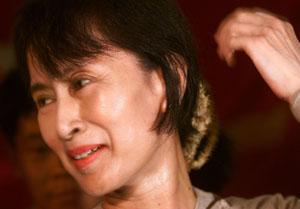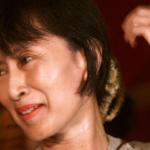Burma's Iron Lady
The year 2002 marks the fortieth anniversary of Burma's rule by an intransigent military dictatorship. While practically every other Southeast Asian nation has made some move toward democracy and market liberalization since the end of the Cold War, the so-called Union of Myanmar has remained one of the most repressive and economically stagnant countries in the world -- and, frankly, an embarrassment to its neighbors. One need only stand at a border crossing between Burma and Thailand to see that the two countries are living in different centuries, with the Thais plying their BMWs through swarms of begging and begrimed Burmese children.
But unlike many other "rogue states", Burma has a vocal and coherent political opposition: the National League for Democracy (NLD), which in 1990 scored an overwhelming victory in nationwide elections -- elections that the junta whimsically decided to ignore. And the symbolic leader of the NLD is none other than Aung San Suu Kyi, recipient of the 1991 Nobel Peace Prize and daughter of Burma's late independence leader Aung San.
Freedom from Fear is a collection of writings by and about Suu Kyi, whose integrity and intellect would put a number of more prominent world leaders to shame. The writings range from Suu Kyi's academic essays to recollections by her fellow students at St. Hugh's College, Oxford; as well as correspondence and interviews pertaining to the democracy struggle. Edited by her late husband, the Tibetologist and Oxonian Michael Aris, the book is an excellent introduction to the dire history of post-independence Burma and its only viable savior. Ironically, the book was re-released in 1995 upon Suu Kyi's release from house arrest, a respite that was to prove fleeting. Only this year was she released once more to a mixture of joy and skepticism. For though she has been permitted to travel widely and drum up support for the NLD, no substantial progress has been made in talks with the regnant oligarchs.
Some activists argue that tourism to Burma should be discouraged on the grounds that the revenues support the military. Odd, then, that one of Suu Kyi's essays was originally titled "Let's Visit Burma" and was intended to introduce the country to young people. The essay is a compendious account of Burma and could easily appear in a Lonely Planet guide or an official tourism brochure. It shows a scholar's fastidiousness, a politician's plainspokenness, and a citizen's deep patriotism.
The following essay, "Intellectual Life in Burma and India Under Colonialism", is an attempt to describe the differences between the two countries' approaches to their foreign rulers and their respective independence movements. India had an advantage over Burma in that it had developed an English-speaking intellectual elite that would later form the rulership. India also succeeded in creating a synthesis between Western and indigenous culture. Burma saw little need for such a synthesis, and had become accustomed to autocracy at the national level. Its colonization came so late that intellectuals had little time to develop a coherent independence program; India had been a colony for 200 years.
Some say that newly-independent colonies revert to autocracy because the colonized peoples have no experience with democracy, and should hardly be expected to accept this "foreign" political system. Suu Kyi strongly disagrees, and the 1990 election results are her vindication. Still, the oligarchs have tried to discredit her as a "neo-colonialist bogey" by accusing her, bizarrely, of being everything from a CIA agent to a Communist to a sexual pervert.
Suppose the Burmese are ready for democracy. Why then have they tolerated tyranny for so long? In an interview with US Congressman Bill Richardson, Suu Kyi argues that the Burmese have the ability to rule themselves but lack the confidence to do so. The cycle is vicious, for confidence will come only with successful self-rule. Suu Kyi has been called "Burma's Gandhi", and she certainly has his charisma, self-discipline, and intelligence; what Burma needs is a Nehru, a shrewd and practical politician able to harness Suu Kyi's popular appeal. Yet Burma-watchers see no such figure forthcoming.
Unfortunately Suu Kyi does not care for politics and would only grudgingly be involved in the leadership of a free Burma; like Gandhi, she seeks a spiritual or social revolution but shuns the dreary details of political administration. The same may perhaps be said of the Burmese themselves: most of them are Buddhists before they are democrats, and they are probably more concerned with their families and villages than with their abstract nation.
Thai democracy may furnish lessons for democracy in Burma. For Thais generally lack a sense of civic duty; there is nationalism, but it often does not manifest itself in a desire to improve the nation. People are too busy helping themselves or their families to be bothered. And partly Buddhism's emphasis on self-reliance is to blame for this. Laudable as a philosophy, Buddhism does not foster the sense of brotherhood necessary for a unified state. What is worse, Burma has a sizable Muslim population that may, if events elsewhere are any indication, demand its own miniature version of an imaginary Caliphate. And the Muslims are but one of Burma's many minorities, whose centrifugal tendencies are used to justify Burma's militarized and tyrannical rule.
In addition to Gandhi, Suu Kyi has named Martin Luther King Jr. among her sources of inspiration, and she subscribes to his view (in turn a view of Thoreau's) that any unjust law may be, and indeed should be, disobeyed. Like her predecessors, she has therefore undergone her fair share of detention, as have numerous NLD members. In an especially dramatic and much-recounted episode, she walked defiantly toward a group of soldiers with orders to shoot her for leading an illegal public procession. But at the last minute the soldiers' commanding officer retracted the shooting orders. This is freedom from fear indeed.
If Jesus were to return to Earth, he would probably be murdered all over again. So goes the joke, anyway. Certainly history has not favored, but has rather suspected, benevolence. Suu Kyi has probably lost some Western support due to her skepticism of free markets as the cure-all for social and political ills. To her mind, political reform will create economic reform, while the converse is not necessarily true. Meanwhile her emphasis on spiritual reform must seem positively baffling to neo-liberal economists who believe that they can wave the magic wand of capital and -- voila! -- democracy.
Suu Kyi's spirituality runs deep, and arguably without her commitment to Buddhism her political achievements would be much diminished. Like Gandhi, she draws on religious texts in formulating her political philosophy. In the essay "In Quest of Democracy", she enumerates the Buddhist Ten Duties of Kings: "liberality, morality, self-sacrifice, integrity, kindness, austerity, non-anger, non-violence, forbearance, and non-opposition (to the will of the people)." Negate each one of these terms and you have a fair description of the present regime, while the terms themselves are a fair description of Suu Kyi. While falling short of canonizing her, her friends and admirers confirm that she is a woman of high principle and immaculate personal habits. Offering a human touch, one Oxford friend relates Suu Kyi's one experiment with alcohol -- a tiny bottle shamefully consumed in a bathroom -- and her subsequent determination to banish it from her life. Compare this to the no doubt very lavish junkets that the regime uses for its meetings with foreign dignitaries, not to mention the copious drug money fueling its reign.
The abiding genius of the Gandhian campaign was its refusal to use violence as a means of settling disputes. Gandhi made guns look ludicrous, and he transformed violence from a sign of strength into a sign of weakness. Suu Kyi has adapted this philosophy with some success. But a lathi is not a machine gun; and because the oppressors in this case are Burmese, and Burma is such an economic nonentity, there is far less outrage when atrocities do occur. It is believed that more Burmese were massacred during the protest marches of 8 August 1988 (called 8/8/88 for short) than were killed in Tiananmen Square the following year. Yet it is clear which event received (and still receives) greater media attention.
It is hard to say what will turn the advantage in favor of the NLD and Suu Kyi, though she would probably maintain that the advantage is already hers. She has popular support, while the regime, as she has observed, has only guns. But it must give her pause that both King and Gandhi (not to mention her father Aung San) were assassinated before beholding the fruit of their patient labors. Let us hope that history will not repeat itself in this case, and that Suu Kyi will live to see her people -- well, why not? -- free at last, free at last.
* * * * *
Review of Aung San Suu Kyi's Freedom from Fear, Penguin Books, 1995.
* * * * *
 ThingsAsian
ThingsAsian















